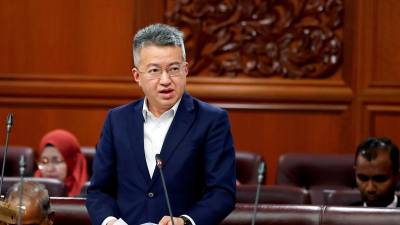KUALA LUMPUR: Malaysia remains confident about maintaining its position as a middle power in the global semiconductor supply chain through implementation of the National Semiconductor Strategy.
Deputy Investment, Trade and Industry Minister Liew Chin Tong said the country’s semiconductor industry has developed over fifty years with particular strengths in outsourced testing and packaging activities.
He stated that strategic location, comprehensive infrastructure, and skilled local workforce further enhance Malaysia’s appeal to foreign investors in this high-technology industry.
“Through the NSS, the government focuses on attracting foreign investments that possess advanced technologies, including advanced packaging,” he said in the Dewan Negara today.
Liew explained that the government aims to establish at least ten Malaysian companies in advanced design and packaging with annual revenues of one billion dollars.
He added that the strategy includes creating one hundred high-income local semiconductor-based companies generating annual revenues of one billion ringgit.
“From early 2024 through the first quarter of 2025, the NSS has made progress, including training 4,557 engineers and technical personnel,” he said.
Liew mentioned the identification of over 23,000 potential job opportunities and securing investments worth 52 billion ringgit.
He confirmed that domestic investment accounted for 2.1 billion ringgit while foreign investment reached 49.9 billion ringgit.
The deputy minister also noted the founding of five local integrated circuit design companies during this period.
Additionally, Liew said the Ministry of Investment, Trade and Industry is identifying local companies with potential in each semiconductor supply chain segment.
“This includes supplying chemicals and materials, manufacturing machinery and equipment, wafer fabrication, testing, and IC design to strengthen the existing ecosystem,” he elaborated.
Addressing concerns about semiconductor companies relocating to the United States, Liew said MITI remains optimistic as many local companies supply other markets.
He specifically mentioned China, India, Japan, Korea, and Southeast Asia as important alternative markets for Malaysian semiconductor products.
“So, our opportunities remain,” Liew stated regarding potential impacts of new US tariff policies.
He expressed hope for developing a horizontal integration strategy where the local semiconductor industry collaborates with automotive, defence, and medical device industries.
This approach would strengthen the country’s technological capabilities for markets beyond the United States including Asia and Africa.
Responding to job loss concerns, Liew emphasised that the US is not the sole export market for Malaysian semiconductor products.
He noted that many companies supply regional firms and supply chains across India, China, Japan, South Korea, and Southeast Asia.
“There are still opportunities to grow this sector through the NSS strategy,” Liew reassured regarding the industry’s future prospects.
He reiterated the potential for horizontal integration between semiconductors and other key industrial sectors.
This strategy would enable local companies to develop mid-level technologies for diverse international markets. – Bernama
